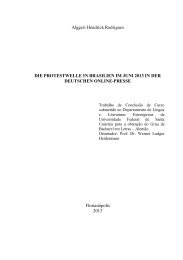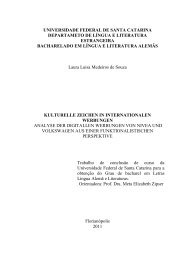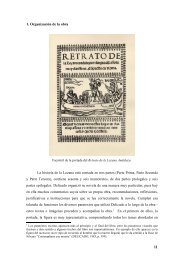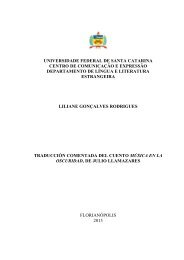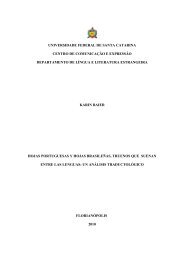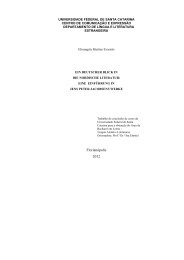TCC - Marcia Regina Barreto Moraes - Departamento de Língua e ...
TCC - Marcia Regina Barreto Moraes - Departamento de Língua e ...
TCC - Marcia Regina Barreto Moraes - Departamento de Língua e ...
You also want an ePaper? Increase the reach of your titles
YUMPU automatically turns print PDFs into web optimized ePapers that Google loves.
mercantilism. Moreover, it brings the first impressions on aboriginal inhabitants and nature.<br />
This document can be consi<strong>de</strong>red the birth certificate of Brazil. As a notary working for the<br />
Portuguese court, Caminha valued aspects of the new land reality. The way his report<br />
<strong>de</strong>scribes is representative of the European colonial system at that time: White-Catholic.<br />
Viewed as savages, the Indians shocked the Portuguese “civilized” world, especially for the<br />
custom of “walking naked showing their shames”: 6<br />
A feição <strong>de</strong>les é serem pardos maneiras d’avermelhados <strong>de</strong> bons rostros e bons<br />
narizes bem feitos. Andam nus sem nenhuma cobertura, nem estimam nenhuma cousa nem<br />
mostrar suas vergonhas e estão acerca disso com tanta inocência.<br />
In their books, Mary Louise Pratt and James Clifford explain these travel<br />
experiences as anthropological and ethnographic documents. The former affirms that, in the<br />
late eighteenth century, travel writing became popular among European rea<strong>de</strong>rs because<br />
they felt like being part of the continent expansionism. Pratt un<strong>de</strong>rlines two types of texts:<br />
ethnographic and autoethnographic. “Europeans represent to themselves their (usually<br />
subjugated) others” in etnographic texts, while “the others” give an answer to or establish a<br />
dialogue with “those metropolitan representations” in autoethnographic texts. 7<br />
Travel means movement. James Clifford adds that according to the travelers’<br />
conditions – if they are “materially privileged” or “oppressed” –, these reflect on the “travel<br />
at issue”. Travel represents, in his opinion, “a range of material, spatial practices that<br />
6 Alfredo Bosi. História Concisa da Literatura Brasileira (14-15).<br />
“A Carta, <strong>de</strong> Pero Vaz <strong>de</strong> Caminha” at www.cce.ufsc.br/~nupill/literatura/carta.html.<br />
“Brazil’s Birth Certificate: The Letter of Pero Vaz Caminha” at www.jstor.org/pss/1316707<br />
7 Mary Louise Pratt. Imperial Eyes: travel writing and transculturation (3) (9).<br />
3



